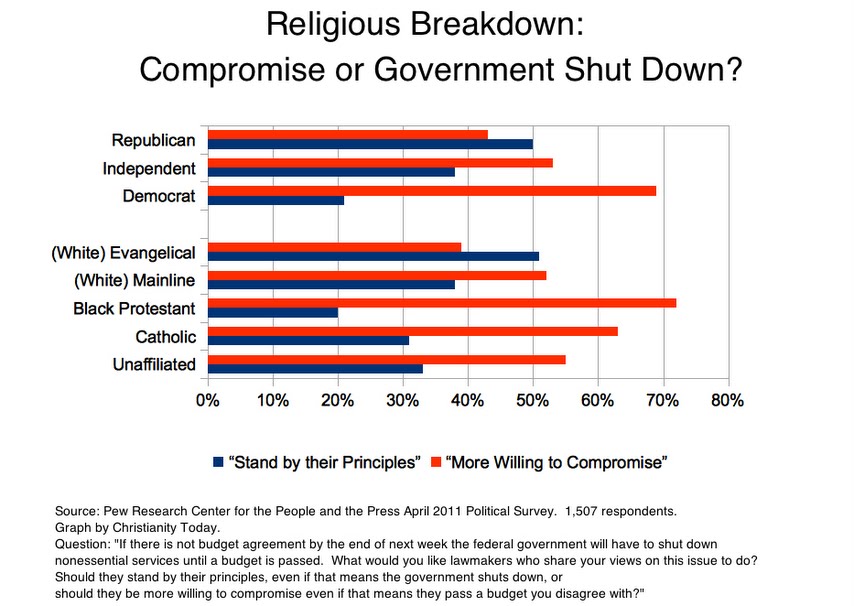The federal government is, once again, nearing a government shutdown due to the impasse between House Republicans and Senate Democrats over this year’s budget. The key issue is how much to reduce discretionary spending. For evangelical political leaders, the fiscal fight represents a moral battle where there is little room for compromise.
A recent poll by the Pew Research Center for the People and the Press suggests that a majority of Americans want legislators to compromise, but evangelicals want politicians to stand their ground.
Pew asked the public how they wanted lawmakers who share their views to do. A majority of Americans (55 percent) said that their legislators should “be more willing to compromise even if that means they pass a budget [I] disagree with.” Only 36 percent said lawmakers should “stand by their principles even if that means the government shuts down.”
Evangelicals are more likely to want lawmakers to say, “Here I stand. I can do no other.” Among the major religious groups in the U.S., evangelicals are the most likely to agree that their lawmakers should not compromise even if it leads to a shutdown. A majority (51 percent) took this position; 39 percent favored a compromise.

This attitude on the budget is not found among other religious groups. Black Protestants are the most in favor of compromise (72 percent). A majority of other groups including Mainline Protestants (52 percent), Catholics (63 percent), and nonreligious people (55 percent) support compromise even if it means a budget that they disagree with.
Social conservatives want to keep in a complete ban on funding for Planned Parenthood. Advocates for relief organizations are conducting a month-long fast to raise awareness of cuts to aid for the world’s poor. Both groups are calling on lawmakers to resist any compromise that violates these issues.
Even though Pew asked people about “lawmakers who share your views,” those who held more conservative political views were more likely to want lawmakers to make a stand. Support for “standing by their principles” was highest among Republicans (50 percent) and conservatives (48 percent) and lowest among Democrats (21 percent), moderates (26 percent) and liberals (31 percent).
If a shutdown occurs, evangelicals would blame President Obama, not Republicans. A majority (55 percent) said Obama would be to blame; only one-fifth said it would be the GOP’s fault. Other religious groups tended to blame both sides. Black Protestants were the only religious group to have a majority (72 percent) put the blame on the Republicans.
Republicans in the poll would blame Obama (68 percent). Democrats would blame Republicans (70 percent). Independents were split, with one-third blaming the president, one-third naming Republicans, and one-quarter pointing fingers at both.
The survey, conducted March 30 through April 3, interviewed a random sample of 1,507 adults.
Editor’s Note: The Pew Research Center for People and the Press (Pew) provided Christianity Today with a religious breakdown of questions from the poll. However, CT is responsible for all analysis and interpretation of the results. Pew identifies evangelicals as white, non-Hispanic Protestants who described themselves as “born-again or evangelical.” Around 18 percent of Americans are evangelicals by this definition. The margin of error for each religious group is larger than for the sample as a whole. The results are descriptive; religious differences could be due to partisanship, ideology, income, or other factors.








